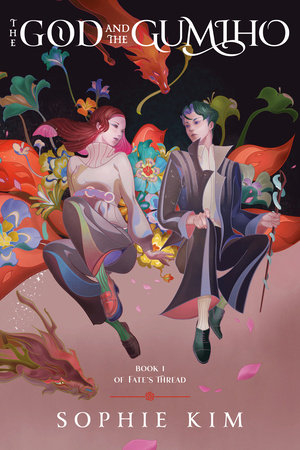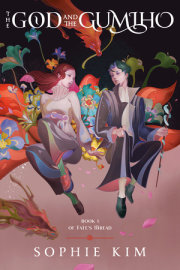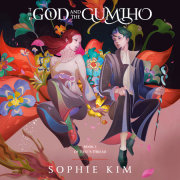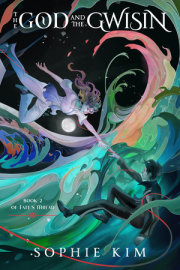Chapter OneNew Sinsi, South Korea, 1992On the mortal realm of Iseung, a lone cherry blossom is carried on a soft breath of wind. Its petals ripple as it rides the gust, twirling and tumbling and twisting through the narrow street of New Sinsi. It brings with it a sweet, saccharine aroma of nectar and ambrosia, so at odds with the smell of the city—the sour tang of gasoline, the greasy sizzle of frying meats, and the perpetual undercurrent of cigarette smoke that never quite seems to fade.
The city is small, but it’s not quaint. As the cherry blossom flutters through the city, weaving through iron lampposts and sagging newsstands, it narrowly dodges haggard-looking pedestrians who carry battered briefcases and lukewarm cups of coffee in their ink-stained hands. Their worn shoes trudge toward the towers of smudged glass and reinforced concrete, their minds already preparing for a day of rustling through mounds of paperwork.
The cherry blossom floats through a honking intersection, past the woman selling roasted sweet potatoes, past the uniformed schoolchildren hopping over cracks fissuring through the dull sidewalks. It is so very far from its home in the city’s park. The blossom sighs softly, weary and homesick.
It is losing momentum now, teetering precariously on the supporting wind, dipping down to the pavement below. The cherry blossom has emerged in New Sinsi’s shopping district, hovering just outside of a boxy black building harboring a sign reading weapons, war armor, and other wants in the blocky script of Hangul. In smaller lettering at the bottom are the words no mortals allowed.
The owner shouldn’t have worried. The shop is, after all, invisible to the common men of Iseung.
With a final weary flutter, the cherry blossom begins to tumble to the sidewalk just outside the shop. Its adventure has ended; now, it is time to rest. Its delicate pink petals wither and curl inward as it floats down, down, down . . .
. . . and lands not on the sidewalk as it had so aimed, but on the shoulder of a black-haired man with cruel green eyes who stands before the shop with his mouth set into a hard, thin line.
Impatiently, the man flicks the flower away from his sharp black suit with a slender finger. He has had enough of those infernal flowers. To his displeasure, they bloomed early this year. It is not even April yet. It is the second of March.
It is clearly the work of Jacheongbi. The man mutters a curse under his breath. The goddess of agriculture has allowed the flowers to bloom early simply to spite him. She knows how much he despises the damn things. They make him sneeze uncontrollably, like some sniveling mortal. “Does she not fear me?” the man asks under his breath, adjusting his grip on the glossy black cane he holds in one hand. He tilts his green gaze up to the heavens and sneers. “Insufferable,” he hisses.
There is no response.
The man returns his gaze to the shop before him. “ ‘No mortals allowed,’ ” he reads then laughs under his breath. He clucks his tongue once, twice. This statement is not a bother to him—for he is not mortal, after all.
The door is locked. The man looks at it in distaste, and with a sharp flick of the wrist, breaks the knob to allow himself entry. There’s a sharp clatter on the other side.
“Jae-jin,” the not-mortal calls sharply as he strides into the shop, the bell above the door chiming in a high, sweet voice to announce his presence. The shop’s dark walls groan under the weight of polished weapons: sharp jikdos, small yedos, curved woldos, and an assortment of other Korean armaments that the common men have not used in quite some time. The not-mortal strides over to the counter, across a creaking wooden floor, frowning at the chubby, young dokkaebi whose cheek rests on the register’s cold glass, his eyes closed in sleep. Undoubtedly, he has spent the night working himself to exhaustion.
Unlike most other dokkaebi, Jae-jin has no life.
Sighing in exasperation, the not-mortal lifts his cane slightly—and pounds it into the floor.
At the abrupt thump and reverberation that shakes the weaponed walls, Jae-jin lurches upward, spluttering as he rubs his sleep-bleary eyes. Their pupils expand considerably as he takes in the sight of the tall figure before him: the mouth constantly curled in displeasure, the sharp jawline harboring a pulsing muscle, the strong brow arched slightly upward as if to say good morning.
“Detective Seokga,” Jae-jin pants, hastily rising from his perch on the stool behind the register and dipping into a respectful bow. “I—that is to say—we’re not open yet . . .”
Seokga the not-mortal smiles ever so slightly, but it is not a friendly smile. It is a wolf’s smile, all sharp edges and flashing white teeth. “Not open yet?” Seokga purrs, patently ignoring the door handle currently spinning in slow circles on the floor. “I suggest, then, that you lock up your shop.” He watches in interest as a bead of sweat trickles down Jae-jin’s neck, wetting the collar of the boy’s rumpled white shirt. “And invest, perhaps, in deodorant.” His grin grows.
Jae-jin swallows hard. “What . . . what can I do for you today, sir? Another sword polish, perhaps?”
“Ah.” Seokga twirls his cane’s hilt around in his hand, spinning the silver handle in his palm. It is no ordinary handle—it is a rendering of a snake, an imoogi. The monstrous serpent coils around the staff’s glossy black material, encircling with meandering grace until it finally rests its head on the cane’s hilt, content to remain underneath Seokga’s fingers. Its black eyes glitter with malicious intent as Seokga ceases his spinning, instead stroking the imoogi’s head with a tender, almost reverent touch. “My sword,” Seokga murmurs, tightening his grip on the silver imoogi, “took a beating last night.” Snap. With a flick of the wrist, Seokga has transformed the cane into a weapon, the imoogi hilt glinting in the morning sunlight streaming through the shop’s window, and the long, silver blade shining as Jae-jin sucks in an appreciative breath. The sword’s sheath, the cane, has disappeared. The imoogi now coils down the blade’s length, scales as sharp as teeth. Seokga levels his sword in both of his hands and places it gently on the counter. “Fix it,” he demands. “I will need it again by tonight.”
Jae-jin frowns slightly, bending down to examine the weapon. “I don’t see where it took a beating, sir.” Indeed, the sword seems spotless, no marring in sight.
Seokga heaves a long-suffering sigh and impatiently points to a small spot on the very edge of the blade—a dent that, to the average creature, is not noticeable without a magnifying glass. “There,” he says as if Jae-jin is a particularly dumb child. He wonders if the dokkaebi has lost the acute vision that all goblins possess. “Have it fixed within the hour.”
“Oh,” Jae-jin says hastily, squinting. “Yes, yes. I see it now.”
Seokga lifts a brow, half-sure that the dokkaebi is bluffing and will reach for the magnifying glass after he has gone.
“Was it an Unruly gwisin?” Jae-jin asks eagerly as he lifts his gaze to Seokga’s. “A baegopeun gwisin? Or”—here, Jae-jin’s voice drops to a hushed whisper—“was it an Unruly gumiho?”
The excited tremor in his voice disgusts Seokga. His job is not as glorious as the foolish dokkaebi believes it to be. Its long hours and unending violence leave him in a perpetual state of what his haetae comrades like to refer to as crankiness.
“It was a dokkaebi,” Seokga warns coldly, “who asked too many questions.”
Jae-jin winces. “I’ll have this done in a half hour,” he mumbles. “Would you like to add on a sword polishing, as well, sir?”
“Just get it done.” Seokga is already making his way to the door.
“Yes, sir!” the dokkaebi calls as Seokga steps onto the street outside. “I’ll get it done, Detective! I promise you that!”
Seokga the not-mortal rolls his eyes and exits the shop, doing his best to hide the slight limp with the support of his beloved cane. His limbs were once mangled and ruined by his fall from grace, and although he has since healed, his right leg has never quite recovered, throbbing with a persistent, dull pain. He presses his mouth into a firm line to hide his discomfort as he continues on his way.
The mortal realm of Iseung disgusts him, but there is one feature—and, mind you, one feature only—that he finds he does not loathe with the entire expanse of his bitter soul.
Coffee.
Copyright © 2024 by Sophie Kim. All rights reserved. No part of this excerpt may be reproduced or reprinted without permission in writing from the publisher.










